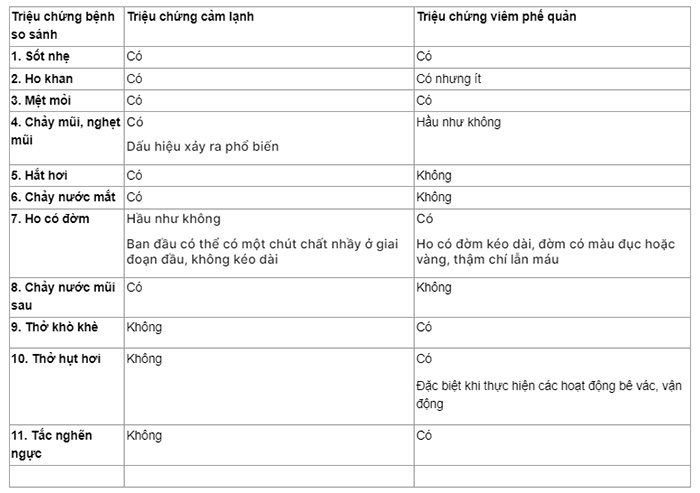Understanding the differences between a cold and bronchitis in terms of symptoms, causes, and warning signs will help you determine what actions to take for a quick recovery and when to see a doctor.
1. Symptoms of Cold and Bronchitis
The symptoms of a cold and bronchitis are often quite similar. Both conditions cause coughing, mild fever, and fatigue. Since bronchitis is an inflammation of the lower respiratory tract, primarily affecting the bronchial tubes, it mainly leads to symptoms related to the lungs.
On the other hand, a cold occurs when the lining of the nose and throat becomes infected with a virus, leading to upper respiratory symptoms such as post-nasal drip from mucus flowing down the back of the throat.
Symptoms commonly associated with a cold that are not seen in bronchitis include:
- Post-nasal drip, nasal congestion
- Sneezing
- Watery eyes
- Dry cough

Both colds and bronchitis can cause fatigue. (Photo: S).
Symptoms of bronchitis that are not seen in colds include:
Chest pain
- Shortness of breath
- Wheezing
- Chest congestion
- Productive cough: A key symptom of bronchitis is a productive cough, where the mucus is often cloudy or yellow.
Below is a comparison table of cold and bronchitis symptoms:


Both colds and bronchitis can cause fever. (Photo: ST).
How long do symptoms last?
- Cold: Symptoms usually begin with clear, runny mucus. After a few days, the mucus may turn white, yellow, or green, indicating that the body is actively fighting off the infection. A runny nose and dry cough may persist longer but generally improve over 10 to 14 days.
- Bronchitis: Symptoms of bronchitis typically resolve within 1 week to 10 days and often improve without treatment if bronchitis is caused by a viral infection. In cases of chronic bronchitis, symptoms may persist for several months or even years, with multiple flare-ups throughout the year.
2. Causes of Illness
Both colds and bronchitis can be caused by viruses, but bronchitis can sometimes be caused by bacteria leading to acute bronchitis.
In many cases, bronchitis develops as a secondary infection after the immune system is weakened by another illness, such as a cold or flu, when viruses from the upper respiratory tract spread to the lower respiratory tract.

Both colds and bronchitis can be caused by viruses. (Photo: ST).
- Cold: Rhinovirus is the most common cause, along with Enterovirus, Adenovirus, etc.
- Acute Bronchitis: Can be caused by either viruses or bacteria. Influenza (flu virus) is often a common cause, along with other viruses such as RSV and Adenovirus. Additionally, bronchitis may be caused by bacteria like Mycoplasma (which causes pneumonia) or Bordetella pertussis (which causes whooping cough), or by prolonged exposure to irritants such as cigarette smoke, dust, and air pollution. Chronic bronchitis is often due to repeated inflammation of the bronchial lining over extended periods.
3. Transmission
Bronchitis itself is not contagious, but the viruses and bacteria that cause it are. For example, if you have a cold and then develop bronchitis, the cold virus can spread to others and cause illness. However, not everyone who has a cold will develop bronchitis.
Similar to the common cold, the risk of developing bronchitis increases when you are in close contact with others in crowded places for extended periods. The primary route for viruses to enter the body is through the eyes, nose, or mouth, or through airborne droplets when an infected person coughs or sneezes.
4. Signs That Require Early Medical Attention
– If you have a cold, contact a doctor early if you experience any of the following symptoms:
- Shortness of breath or rapid breathing
- Dehydration that cannot be rehydrated orally, sunken eyes, etc.

Contact a doctor if you have a cold or bronchitis and symptoms do not improve. (Photo: ST).
- Fever lasting more than 3 days
- High fever that does not decrease and does not respond to antipyretics
- Symptoms lasting longer than 10 days with no signs of improvement, or worsening
- Symptoms such as fever and cough improve but then return and worsen
– If you have bronchitis, contact a doctor early if you experience any of the following symptoms:
- Fever above 38 degrees Celsius or higher
- Cough with red or blood-streaked mucus
- Difficulty breathing
- Symptoms lasting longer than 3 weeks
- Frequent recurrent episodes of bronchitis.
Both colds and viral bronchitis can resolve on their own without treatment. In some cases, over-the-counter medications, rest, and staying hydrated may be recommended. For bacterial bronchitis, a doctor may prescribe antibiotics, and in cases of severe bronchitis, hospitalization may be required.



















































